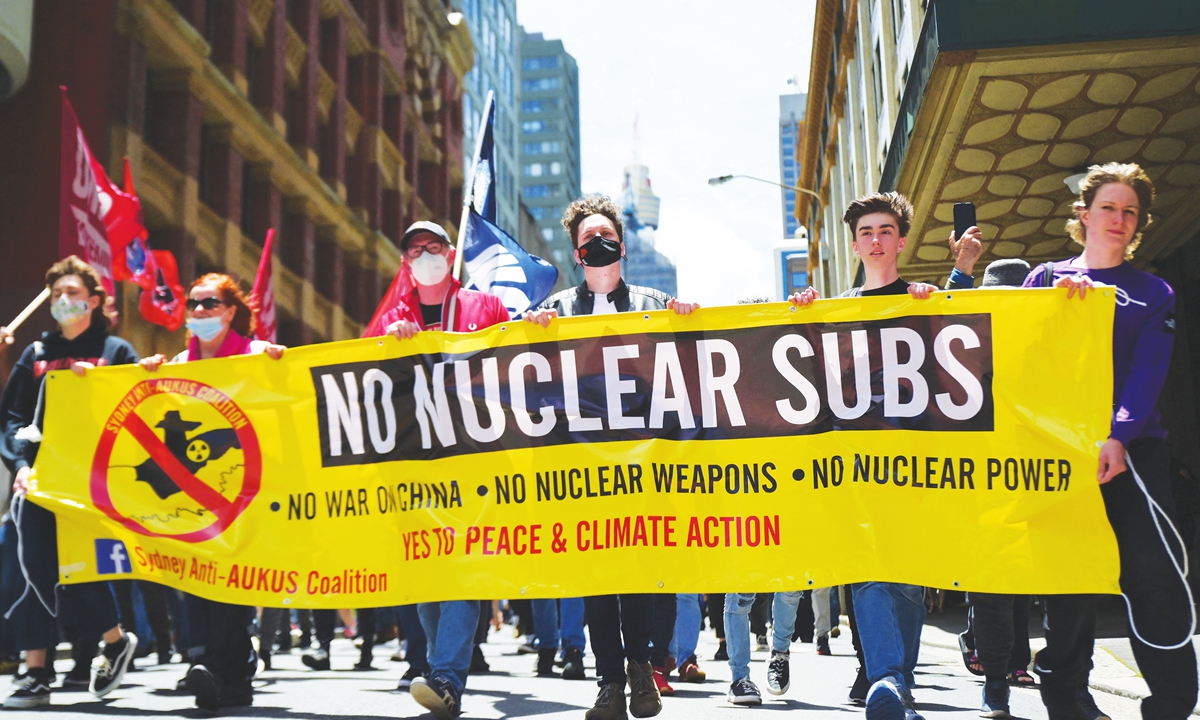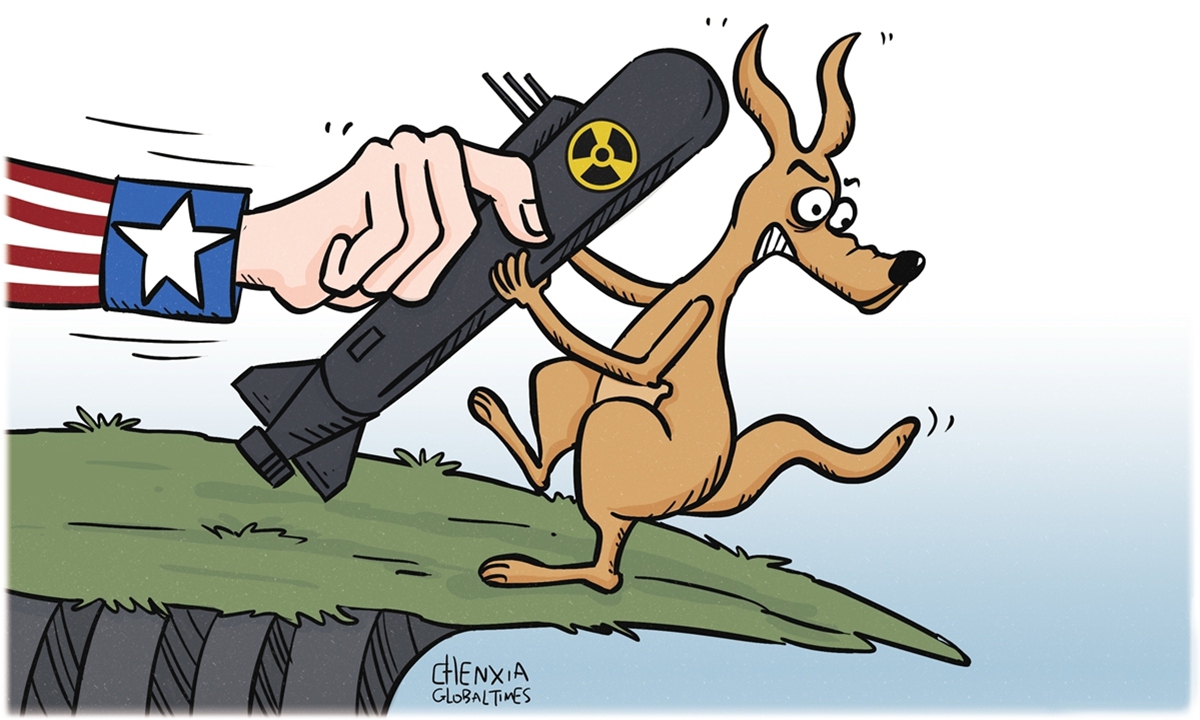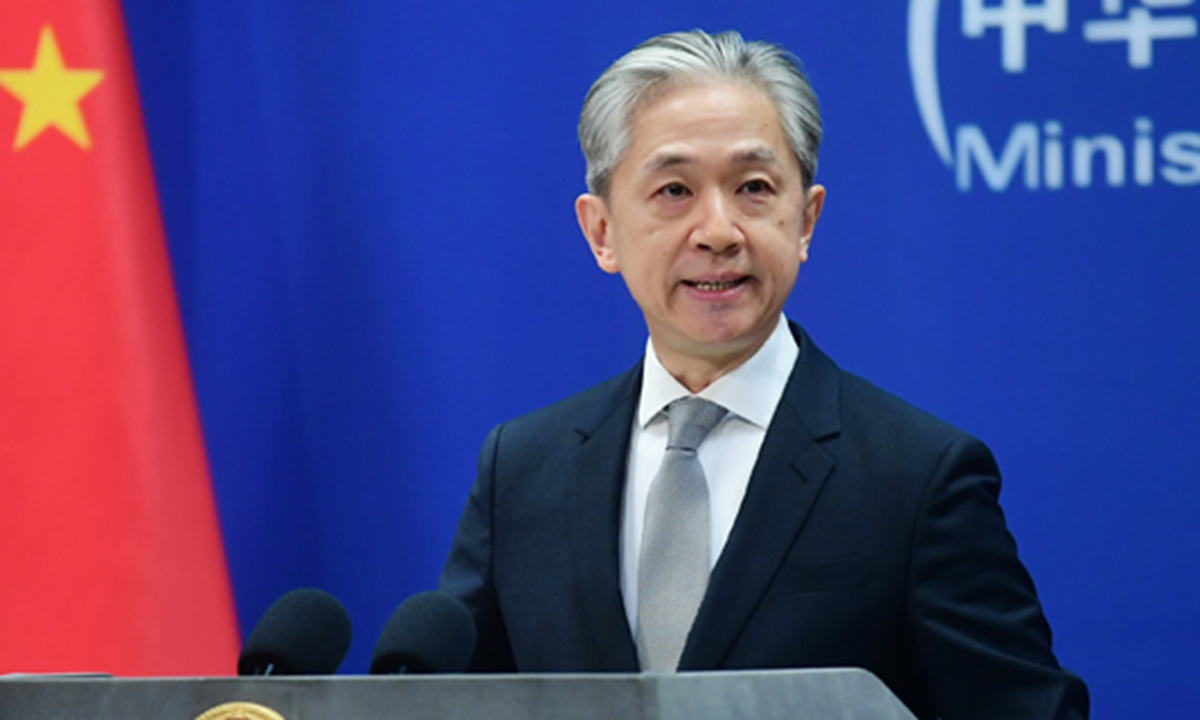
Members of the Sydney Anti-AUKUS Coalition hold a protest in opposition to the AUKUS military agreement, the development of nuclear submarines and war on China on December 11, 2021. Photo: AFP
Editor's Note:
The AUKUS agreement between Australia, the UK and the US, announced in September 2021 by the leaders of the three nations, has raised questions about the negative impact the pact has on Australia, and the health risks it poses. At what levels will AUKUS threaten health? What do the Australian ordinary people fear about AUKUS? In her I-Talk show, Global Times (GT) reporter Wang Wenwen talked to Sue Wareham (Wareham), national president of the Medical Association for Prevention of War (Australia), on these issues.
GT: Most analysts focus on the military and nuclear aspects of AUKUS. As a health professional you focus on the health risks brought about by AUKUS. What health risks does AUKUS carry? How will it endanger the environment?
Wareham: The major part of AUKUS is the nuclear reactors, wherever they are, whether they're located on land or in a submarine, they always carry health risks.
In the event of an accident or military attack by a submarine, there is the risk of radioactive material being released into the environment. That can contaminate the environment for long periods of time and the radioactive exposure can have an effect on human health. We know that there's no safe level of radioactive exposure.
Another aspect is the problem of high-level waste which submarines will produce. Again, this poses radioactive risks for those who are exposed, as well as for future generations.
Over and above all of that, there are the health risks from war itself. AUKUS is increasing tensions within the region. This is a very bad development. If a war were to break out involving China, the US, and possibly Australia, the health risks of such a war would be absolutely catastrophic and then there would be the additional risk of nuclear war, which would escalate the situation to a whole different level. Wars have overwhelming health impacts, often leading to long-term psychological problems with no easy solutions. Some interventions can be made, but a number of the problems created by war are lifelong, not only lifelong for the victims, but continue into future generations. So preventing the health impacts of warfare is our primary goal. Preventing health problems before they arise is crucial. And that's the reason why we need to prevent wars before things start to get out of control. Prevention is our key message in relation to warfare.
In relation to the environment, all of these things have an impact on the environment. There are other aspects such as the enormous funding, which is going into the AUKUS program when significant parts of our healthcare system aren't adequately funded.
GT: Which part of Australia will be most affected?
Wareham: The parts most affected would be those where the submarines are housed. Our major naval base is HMAS Stirling, which is just south of Perth on the western coast. The government tells us there is to be a base on the east coast, a major naval base for nuclear submarines, but they haven't announced where that will be. The submarines do visit other ports, but the submarines are being built in Adelaide, which is on the southern part of the country.
I should say that if a war were to break out, then northern parts of Australia would be extremely heavily affected. They have been heavily militarized at the moment. Darwin and other parts in the Northern Territory, the Tindal air base near Katherine - all of those would be heavily affected in the event of war.
GT: How do you plan to make the Australian government aware of this? Do you think your campaigning efforts will have an impact on government decisions?
Wareham: In terms of campaigning, we do the usual types of campaigning with briefing materials, rallies, meetings and events like that. There was a parliamentary inquiry recently in relation to the nuclear safety bill, which is to authorize various aspects of this submarine development. Unfortunately, the report from the inquiry in relation to nuclear waste was not good. It gave the defense minister the power to designate any part of the country a high-level nuclear waste dumping ground, which is a very bad policy and a very bad outcome.
We need to keep advocating, not just on that. We're advocating in relation to the nuclear waste and the regulation of the submarines. We need more open discussion with the government about the whole proposal. We've got a lot of work to do. I think the government hasn't made much indication thus far of taking these concerns seriously enough. The government needs to listen.
GT: As far as you know, besides the health and environment risks we just talked about, what do the Australian ordinary people fear about AUKUS, such as the costs of the agreement, the use of nuclear and the close connection with the US?
Wareham: All of those I would say. On the costs, there's been quite an outcry about the fact that so much is being spent on the proposed nuclear submarines when a lot of other areas of Australian life need additional funding. I think those concerns will probably grow as our military expenditure grows.
On the matter of the submarines being nuclear powered, Australians have consistently rejected civilian nuclear power. We don't have civilian nuclear power in this country, and generally Australians reject the possibility of it, even though the opposition is playing it up right now, which is a bit surprising. There are already people saying, if we're going to have nuclear-powered submarines, why don't we have civilian nuclear power? It seems like bringing nuclear power into Australia through the back door, not because Australians actually want it.
In relation to the US, there is growing concern that Australia joins the US practically every time the latter goes to war. Particularly with the prospect of Donald Trump being the next president of the US, I think most people are even a bit too scared to talk about publicly, because it's quite a frightening concept.
GT: The main justification given for AUKUS is the security it provides against a possible attack by China at some future date. What do you think of this? Will the US promotion of militarism push Australia to join any war at the behest of the US?
Wareham: AUKUS does not increase our security. Anything that might push us closer toward a war, particularly a war between two major military powers, is not increasing our security, that's reducing our security. We believe that all the nations involved need to put maximum effort, not into military capacity such as AUKUS, but we need to put maximum effort into diplomacy, into improving the relationships all round. We're very pleased to see that the relationship between Australia and China has improved under the current government, but it needs to improve much further still.
We need an understanding that if a war were to break out involving the US, China and other nations, it would be catastrophic at every level, in human terms, economic terms, trade, anything else in terms of human rights or anything else that we care about. War would be absolutely the worst outcome. And a war between nuclear-armed nations should be totally off the agenda. We shouldn't even be contemplating the possibility of war.


